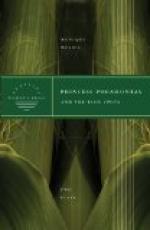“What meaneth this, Matoaka?” asked Powhatan, making use of her special intimate name, which signified Little Snow Feather. He spoke in a low tone, but one so stern that Cleopatra shivered and rejoiced that she was not the culprit.
“It was but a joke, my father,” answered Pocahontas. “I meant no harm.” She hung her head and waited until he should speak again.
“I will have no such jokes in my land,” he said angrily, “remember that.”
With a gesture of his hand and a whispered word of command he sent the Pamunkey braves to the guest lodge. Opechanchanough, still angry at the ridicule that a child had brought upon him, lingered to ask;
“Wilt thou not punish her?”
“Surely I will,” Powhatan answered. “Go ye all to the guest lodge and I will follow. Away, Nautauquas, and carry my pipe thither.”
They were now alone in the lodge, the great chief over thirty tribes and his daughter, who still stood with downcast head. The Powhatan gazed at her curiously. She waited for him to speak, then as he kept silent, she turned and looked straight into his face and asked:
“Father, dost thou know how hard it is to be a girl? Nautauquas, my brother, is a swift runner, yet I am fleeter than he. I can shoot as straight as he, though not so far. I can go without food and drink as long as he. I can dance without fatigue when he is panting. Yet Nautauquas is to be a great brave and I—thou bidst remember to be a squaw. Is it not hard, my father? Why then didst thou give me strong arms and legs and a spirit that will not be still? Do not blame me. Father, because I must laugh and run and play.”
As she spoke she slipped to her knees and embraced his feet and when she had ceased speaking, she smiled up fearless into his face.
Powhatan tried not to be moved by the child’s pleading. Yet he was a chief who always harkened to the excuses made by offenders brought before him and judged them justly, if sometimes harshly. This child of his was as dear to him as a running stream to summer heat. If at times its spray dashed too high, could he be angry?
And Pocahontas, seeing that his anger had gone from him, stood up and laid her head against his arm. She did not have to be told that the mighty Powhatan loved no wife nor child of his as he loved her. Then his hand stroked her soft hair and cheek, and she knew that she was forgiven.
“Thine uncle is very angry,” he said.
“If thou couldst but have seen him. Father, when the arrow whizzed,” and she laughed gaily in memory of the picture.
“I have promised to punish thee.”
“Yea, as thou wilt.” But she did not speak as if afraid.
“Hear what I charge thee,” he said in mock solemnity. “Thou shalt embroider for me with thine own hands—thou that carest not for squaw’s needles—a robe of raccoon skin in quills and bits of precious shells.”




